where did you go on cacation period1
_Unit1_Where_did_you_go_on_vacation__Period_2教案

(4)形容词修饰不定代词时,通常要放在不定代词之后。
There is something wrong with your eyes.
(5)somewhere, anywhere, nowhere, everywhere用作副词。
Trees turn green and flowers come out everywhere.
2. Ask some pairs to role-play the conversation in 2d.
Step 2. Role-Play the conversation
First, present the picture in 2d.
T: Last vacation Helen went somewhere interesting. Look at the picture . Where did Helen go on vacation?
用法:
(1)合成不定代词在句中可以作主语,宾语或表语等。
Nobody will listen to him.
He wants something to eat.
(2)不定代词作主语时,谓语动词要用单数。
There is nothing wrong with the TV.
Everybody likes to be free.
肯定句
somebody=someone
某人
something
某物
somewhere
某地
否定句
not any=no
anybody= anyone
anything
anywhere
《Where did you go on vacation》0课件ppt文档

Where did you go on vacation?
Section A Period 2 (3a-3c)
不定代词
不定代词:不指名代替任何特定名词或形 容词的代词叫做不定代词。常见不定代词 如下所示:
some 一些 somebody 某人 someone 某人 something 某事; 某物
Linda: How did you like it?
anything
Alice: Well, it was my first time everything
there, so _ev_e_r_y_t_h_i_n_g was really nothing
interesting.
Linda: Did you go with _a_n__y_o_n_e_? Alice: Yes, I did. I went with my sister. Linda: Did you go shopping? Alice: Of course! I bought s_o_m__e_th__in_g_ for
nothing 无物 all 全体;全部 both 两个(都) none 没人或物 (指两个以上)
other(s) 另一个 (些) another 另外一 个;又一个 much 很多
many 很多
neither 没人或物
(指两个当中)
anybody 任何 either 任何一个 few 很少
人
(指两个当中) a few 一些;几
anyone 任何人 each 每个
个
anything 任何 事物
no 无 nobody 无人
every 每个
little 很少
八年级上册Unit1Where did you go on vacation教案

Unit 1 Where did you go on vacation?Period 1 Section A (1a-1c)Teaching aims:Vacabulary: (be) on vacation New York City anyone anything waterfallSentences: Where did you go on vacation? Did you go with anyone? Did you buy anything special?Important point:Talk about the past activitiesDifficult point:indefinite pronounTeaching ways:task/situation-based teachingTeaching steps:.Step1. Warming-up and Lead in1. watch a video-Driving home2. Guess: Get Ss to guess what the teacher did on vacation.Where did I go on vacation? What did I do on vacation?3.Free talk: Guide Ss to talk about their own vacation.How was your summer vacation?Where did you go on vacation?Did you do anything special/great?Did you go anywhere int eresting /beautiful…?Did you meet anyone interesting?Step2. PresentationPresent new phrases: went to New York City went to summer camp went to mountains. went to the beach visited museumsT: Where did she go on vacation?S: She went to New York City.T: Where did they go on vacation?S:1a. Match the activities with the pictures.Step3 listeningBefore listening, a question is given:Now some students are talking about their vacations. Where did they go on vacation? Listen carefully and fill in the blanks.Step4. Pairwork 1cA: Where did Tina go on vacation?B: She went to the mountains.Step 5 HomeworkPeriod 2 Section A (2a —2c)Teaching aims:Improve the students’ listening abilityLearn the usage of Composite indefinite pronounImportant Point :How to finish the listening textDifficult Point :improve the students’ listening abilityTeaching ways:task/situation-based teachingTeaching steps:Step 1.GreetingsStep 2.RevisionWhere did sb go on vacation?Step3 Listening1. Ask the students to read the names in the chart, tell the students they will hear three conversations about three people’s vacations. Listen for the first time and fill in the chart. Then listen again and check Yes, or No.2. Let Ss read the phrases in the chart of 2b.3. Play the recording the first time. Ss listen and fill in the chart.4. Play the recording a second time for the Ss to check “Yes, I did.” or “No, I didn’t.”5. Check the answers with the Ss.Step 4. Pair workRole-play conversations between Grace, Kevin and Julie.A: Grace, where did you go on vacation?B: I went to New York City.A: Oh, really? Did you go with anyone?B: yes, I went with my mother.Step 5 homeworkMake up a dialoguePeriod 3 (Grammar focus-3c)Teaching aim s1 .Review the important sentence2. Master the usage of anyone, someone, everyone, something, anything, nothing3. teach students to love natureImportant pointsTalk about past eventsDifficult pointsthe usage of someone, anyone, something, anythingTeaching stepsStep1. Warming- up and revision1. Free talk: Ask Ss the questions: Where did you go on vacation?Ss try to answer the questions.2. Review the usage of Composite indefinite pronounStep2. Grammar Focus.ask the students to read the sentences of Focus, then fill in the blanks .1. 你去了什么地方去度假?______ ______ you go on ___________?2. 我去了纽约市。
where did you go on vacation试讲稿

where did you go on vacation试讲稿
尊敬的评委老师们,大家好!
我今天为大家带来的试讲题目是《where did you go on vacation》。
我们都喜欢旅游,去不同的地方,看不同的景色,体验不一样的文化。
那么,今天我们就来聊聊你们最近去了哪里度假呢?
首先,我想问问你们去的是哪里?是国内还是国外?如果是国内,你们去了哪些省份?如果是国外,你们去了哪些国家?
接着,我想问问你们去的目的地是什么?是为了休息放松,还是为了体验当地的文化风情?是为了看美景还是去探险?无论你们去
的目的是什么,能不能跟我们分享一下你们的所见所闻?
然后,我想问问你们在旅途中最难忘的一件事情是什么?是一次意外的冒险,还是一个美好的回忆?是一次跟当地人交流的经历,还是一次让你感到震撼的经历?
最后,我想问问你们对旅游的看法是什么?旅游是一种享受,也是一种学习和锻炼的机会。
我们可以通过旅游了解不同的文化,学习不同的知识,还可以锻炼我们的身体和心理素质。
以上就是我对《where did you go on vacation》这个话题的一些思考和问题,希望能跟大家一起分享、交流,谢谢!
- 1 -。
2024年《Where did you go on vocation》范文教案

2024年《Where did you go on vacation?》范文教案一、教学目标:1. 让学生掌握询问他人度假地点的交际用语。
2. 让学生能够用英语描述自己的假期经历。
3. 培养学生的听说能力和团队协作能力。
二、教学内容:1. 核心词汇:度假、旅行、海滩、山川、景点、活动等。
2. 核心句型:Where did you go on vacation? / I went to / I did3. 范文:《Where did you go on vacation?》三、教学重点与难点:1. 重点:词汇的掌握和运用,句型的熟练运用。
2. 难点:描述自己假期经历的语言组织能力和听力理解能力。
四、教学方法:1. 任务型教学法:通过完成各种任务,让学生在实践中学习和运用语言。
2. 情境教学法:创设真实的交际情境,提高学生的语言交际能力。
五、教学步骤:1. 热身活动(5分钟):让学生自由交谈,询问彼此的假期计划。
2. 引入新课(10分钟):教师展示范文,引导学生关注核心词汇和句型。
3. 课堂活动(15分钟):学生分组,进行角色扮演,模拟范文中的交际场景。
4. 听力练习(10分钟):播放相关听力材料,学生听后回答问题。
6. 展示与评价(5分钟):学生互相展示作品,教师进行点评和指导。
7. 总结与作业(5分钟):教师总结课堂内容,布置作业(写一篇关于假期经历的短文)。
注意事项:1. 在教学过程中,要注意激发学生的兴趣,鼓励他们积极参与。
2. 对于学习有困难的学生,要给予个别辅导和鼓励,提高他们的自信心。
3. 教学中要注重培养学生的团队协作能力,让他们在互动中学习。
4. 作业的布置要结合学生的实际生活,让他们有话可说。
六、教学拓展:1. 让学生尝试用其他方式描述假期经历,如绘画、摄影等。
2. 组织一次课堂分享会,让学生展示自己的作品,并简要介绍创作思路。
七、教学评价:1. 课堂参与度:观察学生在课堂活动中的参与情况,了解他们的学习积极性。
unit1-where-did-you-go-on-vacation教案 (1)
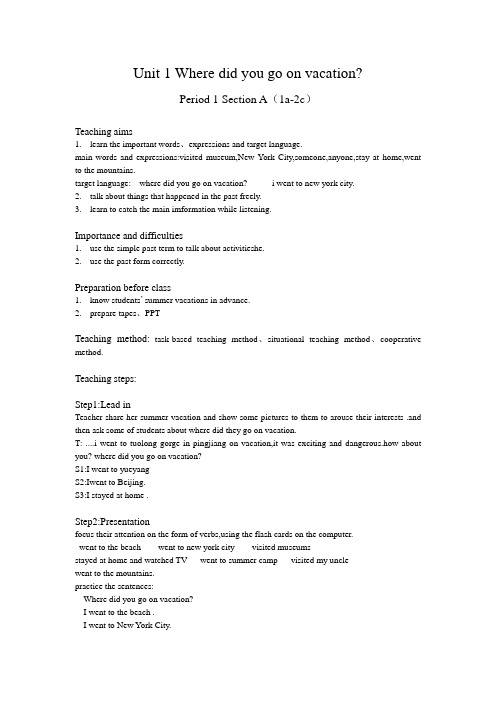
Unit 1 Where did you go on vacation?Period 1 Section A(1a-2c)Teaching aims1.learn the important words、expressions and target language.main words and expressions:visited museum,New York City,someone,anyone,stay at home,went to the mountains.target language:---where did you go on vacation? ----i went to new york city.2.talk about things that happened in the past freely.3.learn to catch the main imformation while listening.Importance and difficultiese the simple past term to talk about activitieshe.e the past form correctly.Preparation before class1.know students’ summer vacations in advance.2.prepare tapes、PPTTeaching method:task-based teaching method、situational teaching method、cooperative method.Teaching steps:Step1:Lead inTeacher share her summer vacation and show some pictures to them to arouse their interests .and then ask some of students about where did they go on vacation.T: ....i went to tuolong gorge in pingjiang on vacation,it was exciting and dangerous.how about you? where did you go on vacation?S1:I went to yueyangS2:Iwent to Beijing.S3:I stayed at home .Step2:Presentationfocus their attention on the form of verbs,using the flash cards on the computer.went to the beach went to new york city visited museumsstayed at home and watched TV went to summer camp visited my unclewent to the mountains.practice the sentences:---Where did you go on vacation?---I went to the beach .---I went to New York City...............Step3:Games1,divide the whole class into two groups and play the game named “quick memory”.revise the activities and past form of verbs above.2,play a chain game to practice the main sentences:where did you go on vacation? I........ask some rows to act out.Step4:Work on 1afinish 1a by themselves and check the answers.Step5:Listening (work on 1b)1.ask students to read the five names in the box.2.look at the pictures to get some information.3.ask students to listen and number the people in the picture.tell them to pay attention to thenames,and get the main information.Step6:Reporteveryone asks three or more classmates about where did they go on vacation,and write it down,then report to the whole class. when one student is reporting ,others should listen carefully and answer and repeat where they went on vacation.Step7:Work on 2a&2b1.Teacher share her experience in beijing and lead the main expressions that will appeared in the following listening material.T:I went to xiangshan park in beijing a couple of years ago,and i went with someone .i went with my friend.so,did i went with anyone?S:Yes,you did .T:I also do something interesting ,i tied a red ribbon to the wishing tree,so did i do anything interesting?S:Yes, you did. ..................................Let them realise the meaning of someone 、anyone、something interesting、anything interesting and something special 、anything special.2.Listen for more information and finish 2a&2bStep8:Pair-work(work on 2c)1.make conversation between grace,kevin and julie according to the listening material or maketheir own coversations .2.act out the conversations.3.Step9:ExercisesDo some exercises on the ppt.Step10:Homework.。
Where did you go on vacation重要知识点默写 人教版英语八年级上册

Unit 1 Where did you go on vacation?【一般过去时】①定义:①当主语是一、三人称单数,be动词变成______当主语是第二人称单复数、一三人称复数,be动词变成______①变否定(两种)①变一般疑问句及回答(两种)【不定代词】由some、any、no、every加上one/body、thing、where构成。
①some用在______句,any用在____________句。
①不定代词被形容词修饰时,要放在形容词______面。
(前/后)③不定代词作主语时,都看作第三人称单数,所以谓语要用_______(单数/复数)【反身代词】①第一、第二人称的反身代词由______________加上self(单数)/selves(复数),第三人称的反身代词由______________加上self(单数)/selves(复数)第一人称:我自己___________ 我们自己___________第二人称:你自己___________ 你们自己___________第三人称:他自己___________ 她自己___________ 它自己___________他/她/它们自己___________②常见固定搭配通过某人自己/独自__________ 自学_______________=____________________玩得愉快__________________ 随便吃/喝点什么______________________SectionA1.相当多____________,修饰(可数n.单数/ 可数n.复数/ 不可数n.)few,修饰(可数n./不可数n.),表示(肯定/否定)a few,修饰(可数n./不可数n.),表示(肯定/否定)little,修饰(可数n./不可数n.),表示(肯定/否定)a little,修饰(可数n./不可数n.),表示(肯定/否定)2.…中的大部分____________,后跟可数n.复数时,谓语用______(单数/复数)后跟不可数n.复数时,谓语用______(单数/复数)3.看起来…________________ 看起来好像…________________ 似乎做某事_______________4.感到无聊的,厌烦的__________,一般修饰_____;令人厌烦的__________,一般修饰_____5.写日记____________6.度假______________ 去度假______________7.拍照片____________=____________8.……怎么样?_____________=____________,后面跟动词______形式9.确实没有,没有什么____________10.除…之外____________,后跟动词______形式11.给某人买某物___________________ = ___________________Section B1. enjoyable(adj.)令人愉快的enjoy(v.)喜欢喜欢做某事__________________玩得愉快___________________=_____________________=__________________2.活动(n.) activity 活跃的(adj.)_________3.决定做某事________________ 作决定__________________4.尝试做某事__________________ 尽力做某事__________________尽某人最大努力做某事________________________ 试一试________________ 5.感觉像____________,后跟名词/从句想要做某事____________________=____________________=____________________6.建筑物(n.) building 建造(v.)____________7.商人(n.) trader 贸易(n.)/交易(v.)___________8.想知道(v.) wonder =_______________ 奇观(n.) wonder9.差别,差异(n.) difference 不同的(adj.) different 与…不同____________________10.等待…_______________ 等待做某事_________________11.因为____________,后跟名词/代词/短语/V-ing因为____________,后跟句子(不能和so连用)12.enough修名词时,放在名词__________修饰形容词/副词时,放在它们____________,其后可接to do或for +名词13.不喜欢做某事____________14.到达①arrive in + _____地点,arrive at + _____地点(大/小)①get ____ + 地点①reach + 地点【注意】如果arrive、get后跟here、there、home等表示地点的副词时,应把介词省略。
Unit 1 Where did you go on vication.
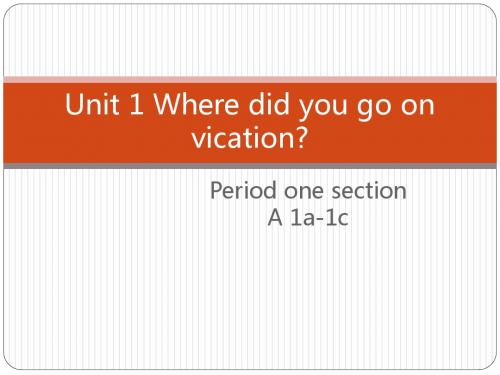
Period one section A 1a-1c
一般过去式:
一:一般过去式的意义 1.一般过去式表示在过去某个时间发生的动作或 存在的状态,常和表示过去的时间状语连用,如: yesterday,last week,last year, in 1990, two days ago(两天前),just now(刚才) E.G : He got up six yesterday. I visited my aunt yesterday. He was a student in 2002.
规则动词过去式的构成和发音:
1. 一般情况,Байду номын сангаас-ed;
look-looked play-played start-started 2.以清辅音,后面读做 e结尾的词,加-d; /t/, live-lived hope-hoped use-used 浊辅音和元音后/d/, 3.以辅音字母加y结尾的动词,变y为i,再加es; /t/和/d/后面读/id/ study-studied carry-carried 4.以重读闭音节结尾的动词,末尾只有一个辅音 字母,双写这个辅音字母,再加-ed; stop-stopped plan-panned
2.一般过去式还可以表示过去经常或习惯性发生 的动作,常与often,always,usually等频率副 词连用。 E.G: He always played basketball last year. She often went to work by bus last year.
二:一般过去式的构成 1. 主语+was/were+其他 2. 主语+动词的过去式+其他
八年级英语上册 Unit 1 Where did you go on vacation Period

Unit1 Where did you go on vacation ?(Section A 2d~3c)一.Teaching aims:1.To learn some sentences to talk about vacation in simple past tense.2.To learn the usage of Indefinite pronouns.二.Key teaching emphasis:To learn the usage of anyone, someone, everyone, no one, anything, something, everything and nothing三.Teaching procedure:Step 1: Leading in: Review the vacation activities with pitctures.(3mins)1)To review the sentence and phrases: ---Where did you go on vacation? --- I went to ....2)To lead in the usage of indefinite pronouns:3) -- Did you buy anything special on your vacation?4) --Yes, I did ./ No, I didn’t .Step 2: Work on 2d(7mins)1. Play the recording and have students to read after it, then answer some questions.2. Students read 2d by themselves with the questions below.1). Did Helen go anywhere interesting?2.)Did she see anything wonderful?3.)Did she take any photos?4).Did Rick do anyting special?3. Have students to underline the sentences with indefinite pronouns. And then roleplay the conversation.Step 3: Summarize the grammar:the usage of anyone, someone, everyone, no one, anything, something, everything and nothing, use general question in past tense and “What question ”(12 mins)1. Have students to discuss the example sentences then find out the answers to thequestions in their exercise paper.2. Teacher corrects mistakes if needed.3. Do some exercise in their exercise paper to consolidate the grammarStep 4:Work on 3a and 3b . (8 mins)1.Have students to finish 3a and 3b individually.2.Have students to check the answer in groups by asking and answering.3. Checks the answer together .Step 5: Work on 3c. (8mins)Ask their group questions about their last vacation. Then tell the class their results. Then ask them to show their report with their group members.Step 7: Summary. (1 min)1. Words:Wonderful, few, something, nothing, everyone, quite a few, of course, myself, yourself, hen, pig, seem, bored, someone, diary.....2. Sentences:1)--Did you go out with anyone ?--No, No one was here. Everyone was on vacation.2)--Did you buy anything special?--Yes, I bought something for my father ./ No, I bought nothing.3)--How was the food? --- Everything tastes really good.4)No one seemed to be bored3. indefinite pronouns :anyone, someone, everyone, no one, anything, something, everything and nothingStep 8: Homework—do a survey. (1 min)Recite Grammar Focus。
初中英语说课稿范文《Where did you go on vacatio》
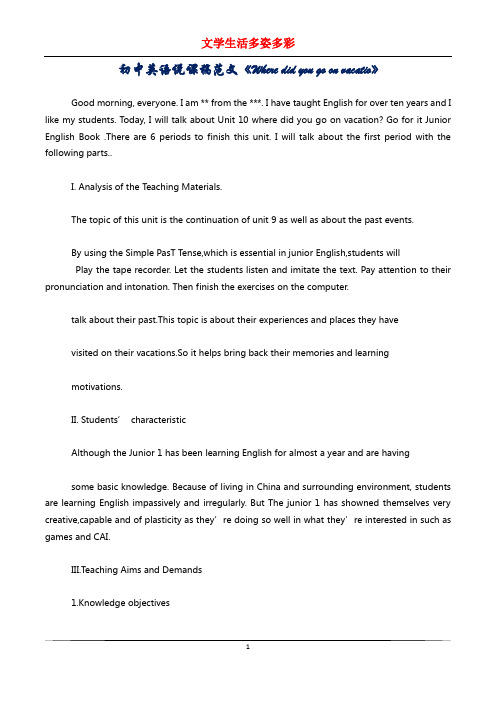
初中英语说课稿范文《Where did you go on vacatio》Good morning, everyone. I am ** from the ***. I have taught English for over ten years and I like my students. Today, I will talk about Unit 10 where did you go on vacation? Go for it Junior English Book .There are 6 periods to finish this unit. I will talk about the first period with the following parts..I. Analysis of the Teaching Materials.The topic of this unit is the continuation of unit 9 as well as about the past events.By using the Simple PasT T ense,which is essential in junior English,students willPlay the tape recorder. Let the students listen and imitate the text. Pay attention to their pronunciation and intonation. Then finish the exercises on the computer.talk about their past.This topic is about their experiences and places they havevisited on their vacations.So it helps bring back their memories and learningmotivations.II. Students’characteristicAlthough the Junior 1 has been learning English for almost a year and are havingsome basic knowledge. Because of living in China and surrounding environment, students are learning English impassively and irregularly. But The junior 1 has showned themselves very creative,capable and of plasticity as they’re doing so well in what they’re interested in such as games and CAI.III.Teaching Aims and Demands1.Knowledge objectivesa. T o enable the students to read, to spell , to understand the vocabulary correctly.b. To help the students ask and answer the new sentence pattern: Where did you go on vacation?2.Ability objectives.a. T o improve the students’skills of listening ,speaking,reading and writing..b. To encourage the students to communicate with others uning the new sentence pattern .3.Emotion objectivesa. T o train the Ss to cooperate well in groups and in pairs.b. To be interested in communicating in English.IV. T eaching Key Points1. Key vocabularyNew York City camp summer camp museum2. Key structuresWhere did you go on vacation?I went to…V. T eaching DifficultyLearn the key structuresVI. T eaching Methods1. T ask-based methodThat’s to say I’ll let the students finish 1 listening task and make short dialogues along with the actions to help the students get a better understanding of the keystructures.2. Communication methodI’ll set up a dream and ask students to pretent themselves as reporters. This way, the students can say freely and needn’t to worry about making mistakes.VII. Learning Methods1. Listening—speaking method2. Communicative strategyWe all know that the best ways to learn English well are to imitate,to practice,to listen,to speak and to communicate more constantly.VIII. T eaching AidsIn this lesson, the CAI, cassette, a tape recorder will be used.X. T eaching ProcedureI’ll mainly talk about this part. It consists of 5 steps.Step 1 Warm – up and review1. Make a free talk between T-S. What did you do yesterday? And what did your best friend do yesterday?2. Write down the past tenses of the verbs that I show in CAI.要说好课,就必须写好Listen to an English song. Let the students do the action while they are listening.(I’m sure children will love this song and get interested in class.)Purpose: this step is in order to review what the students have learnt in Unit 9.That way, I can lead them into the new lesson smoothly. I think It’s usual but pratical.Step 2 Presentation1. Learn the new words and expressionsa. lead—in: ask students some questions: Did you dream last night? What did you dream? Where did I go on vacation in my dream?b. CAI shows many pictures of my dream,which are also the activities in 1a .c. Ask students to read and spell the new phrases.d. Do 1a. Match the activities with the pictures (a—g).e. Play a guessing game: I will show some jigsaws of each picture and have the students to guess. I will praise the student who answers more quickly.Purpose: I put the vocabulary learning into a dream in order to prompt them to find it very interesting to learn English.. By CAI, students can match the vocabulary with the real things directly and master them easily.Step 3 Listening practicea. T ell the students to listen to the tape and number the people (1—5) in the picture.b. Play the recorder for the first time, and then check the answers.c. Play the recorder again, students imitate the conversations and fill in the blanks. Pay attention to their pronunciation and intonation.Purpose: this is a basic and necessary step, which develops the students’skills of listening, reading and writing.Step 4 Pairworka. T—S: where did Tina go on vacation?She went to the mountains.b. Ask the students to practice in pairs as we 1c. Then they will come to the platform and click on the number to choose a picture and act it out randomly最后一个环节就是品味文中优美的句子的含义这个环节放手让学生自由讨论,你认为优美的句子或是不太好理解的句子.Purpose: “T ask-based”teaching method is used here to develop the students’ability ofcommunication and their ability of co-operation will be well trained. This step provides guided oral practice using the target language to consolidate the key structure and It can develop students’skill of speaking and sense of language.Step5 ProductionHave students pretent to be reporters to interview anyone they want to ask about their vacation.Purpose: After learning 1a—1c, it’s time to extend what they learnt just now and give the students a free space to show their abilities. With the real situations, students will feel easy and successful during this part. By way of communication, the students will understand how to use the key structure better and consolidate the knowledge firmly.Part XI HomeworkDo a survey and write a report about the classmates’vocation.Purpose: I think homework is so important that the students can speak english as much as they can in class or after class.I set this step in order to practice students’skills of listening, speaking and writing.能力基础:具体的是收集和处理信息的能力、获取新知识的能力、分析和解决问题的能力、语言文字的表达能力(决不单单指语文学科)、团结协作能力和社会活动能力等6大能力基础。
Unit 1 Where did you go on vacation(Period one)
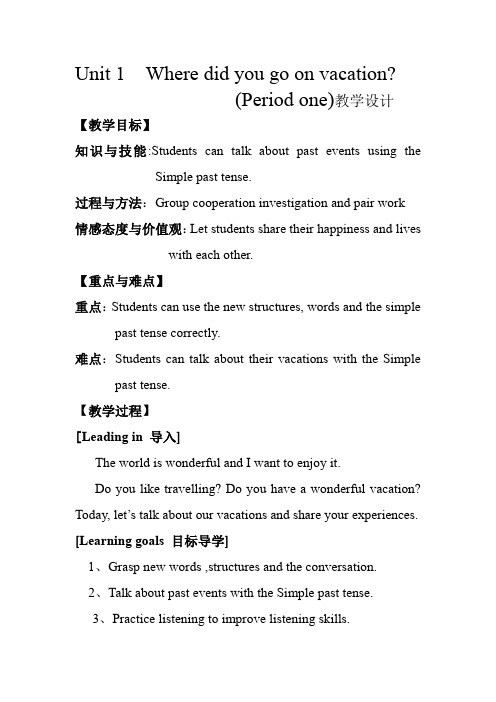
Unit 1 Where did you go on vacation?(Period one)教学设计【教学目标】知识与技能:Students can talk about past events using the Simple past tense.过程与方法:Group cooperation investigation and pair work情感态度与价值观:Let students share their happiness and liveswith each other.【重点与难点】重点:Students can use the new structures, words and the simple past tense correctly.难点:Students can talk about their vacations with the Simple past tense.【教学过程】[Leading in 导入]The world is wonderful and I want to enjoy it.Do you like travelling? Do you have a wonderful vacation? Today, let’s talk about our vacations and share your experiences. [Learning goals 目标导学]1、Grasp new words ,structures and the conversation.2、Talk about past events with the Simple past tense.3、Practice listening to improve listening skills.[Independent investigation 自主研究1a ---1b]Let’s see the picture. They were on vacation and had a good time.First, do you know what they did?stayed at home went to the New York Cityvisited my uncle went to the mountainswent to the beach visited museumsSecond, quickly answerThird ,practice listening[Pair work 两两对话]Make conversations about people and activities in the chart. [Group cooperation investigation 小组合作探究2d]1、Listen the conversation and sense the language.2、Study it together and role-play it with your partners.3、Fill in the mind-map.4、Retell the conversation according to the mind-map.[Ability improvement 能力提升]According to the pictures, choose one picture to introduce your vacation.Where did you do?Who did you do with?How was the weather?How was the food?Did you do anything special?[Conclusion 总结]Students sum up in groups and then present.。
Unit 1 Where did you go on vacation Section A Period 2 课件
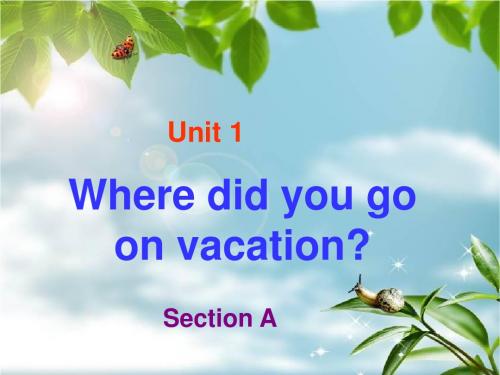
Boy: Did you buy anything special?
Grace: yes. I bought something for my father. Boy: Oh, really? What?
Grace: I bought him a hat.
2a,2b
Conversation 2
Tapescript
Unit 1
Where did you go on vacation?
Section A
Section A
教学目标
学会不定代词及其使用
2a. Listen. Where did people go on vacation? Complete the chart.
People
Grace
Kevin
Places
Yes, I did
No, I didn’t
√ √ √
√ √ √ √ √
play volleyball?
Kevin swim? meet anyone interJulie study for tests? go out with anyone?
2d:Role-play the conversation.
Rick: Hi, Helen. Long time no see. Helen: Hi, Rick. Yes, I was on vacation last month. Rick: Oh, did you go anywhere interesting? Helen: Yes, I went to Guizhou with my family. Rick: Wow! Did you see Huangguoshu Waterfall? Helen: Yes, I did. It was wonderful! We took quite a few photos there. What about you? Did you do anything special last month? Rick: Not really. I just stayed at home most of the time to read and relax.
- 1、下载文档前请自行甄别文档内容的完整性,平台不提供额外的编辑、内容补充、找答案等附加服务。
- 2、"仅部分预览"的文档,不可在线预览部分如存在完整性等问题,可反馈申请退款(可完整预览的文档不适用该条件!)。
- 3、如文档侵犯您的权益,请联系客服反馈,我们会尽快为您处理(人工客服工作时间:9:00-18:30)。
Where did beach.
Listen. Where did Nancy, Kevin, and Julie go on vacation? Match the person with the place.
People
1. c 2. a 3. b
Where did Sally go on vacation?
She stayed at home.
Where did Tina go on vacation?
She went to the mountains.
Where did Xiang Hua go on vacation?
He went to New York City.
Places
Nancy a. the beach Kevin b. home Julie c. New York City
Listen again. For each question check (√) “Yes, I did.” or “ No, I didn’t.” as you hear them talk.
Where did you go on vacation?
visited museums
Where did Brad go on vacation? He visited his uncle.
Where did Tom go on vacation?
He went to summer camp.
Lin: It
PAIRWORK
How was the bus trip? It was relaxing.
PAIRWORK
How was the museum? It was boring.
PAIRWORK
How was the food? It was awful.
PAIRWORK
How was the beach? It was beautiful.
visited my uncle
Where did you go on vacation?
went to summer camp
Where did you go on vacation?
went to the mountains
Where did you go on vacation?
went to the beach
⑴
was the weather? ⑸
Lin: It was pretty good.
⑵
Amy: How were the beaches?
⑶ Lin: They were fantastic. ⑷
was hot and humid. ⑹ Amy: How were the people? ⑺ Lin: They were unfriendly. ⑻
Unit 10
Where did you go on vacation?
初二五班王燕
Where did you go on vacation?
stayed at home
Where did you go on vacation?
went to New York City
Where did you go on vacation?
Fill in the blanks in the conversation. Use “was” or “were”. Example: It was rainy. The mountains were beautiful.
Amy: How was your vacation, Lin? Amy: How
Did you … Nancy go to Central Park? Kevin Julie play volleyball? swim? go to the movies? study for exams?
Yes, I did
No, I didn’t
√ √ √ √ √
GROUPWORK
Nancy, where did you go on vacation? I went to New York City. Oh, really? Did you go to Central Park? Yes, I did.
